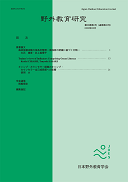
- Issue 2 Pages 1-
- Issue 1 Pages 1-
- |<
- <
- 1
- >
- >|
-
Classification based on activity organizers' understandingYasuhiko OISHI, Mariko INOUE2012 Volume 15 Issue 2 Pages 1-12
Published: July 01, 2012
Released on J-STAGE: May 21, 2013
JOURNAL FREE ACCESSIn Japan, various forest experience activities are performed, but the activity organizers' understanding of the activities varies. In order to develop the activities and enhance regional cooperation, and also from the viewpoint of activity organizers, all forest experience activities need to be systematized. This study aimed to achieve this systematization, and obtained the following results.
1. From surveys of activities performed in two regions, 40 basic activities were extracted. 2.Mathematical quantification theory class Ⅲ analysis was conducted on organizers' stance and judgment as to whether the basic activities were appropriate for their purposes or not. Three axes were found to be involved in forest activity participation: Axis 1: functions of nature (production or environment), Axis 2: capacity of the participant (capacity to feel or to create), and Axis 3: target of activities (for people or for the natural environment). The activity classes concerning forest resources, natural environment, and contact with nature were found to lie on the plane formed by Axis 1 and Axis 3, and their mutual relationships were clarified.View full abstractDownload PDF (746K) -
Koichi CHIASHI, Tsuyoshi SASAKI2012 Volume 15 Issue 2 Pages 13-19
Published: 2012
Released on J-STAGE: December 29, 2018
JOURNAL FREE ACCESS -
Masaru TOKUOKA2012 Volume 15 Issue 2 Pages 21-33
Published: 2012
Released on J-STAGE: December 29, 2018
JOURNAL FREE ACCESSPrevious studies concerning camps have examined the effect of camps on the development of campers. The studies focused not only on campers but also on camp counselors, especially the group leader. The current studies examined the effect of the experience of the camp counselor in direct interaction with campers on the camp counselor's self growth feelings. The first of the two related studies developed a multi-factor scale for use in quantifying the camp counselor's self growth feelings and assessed the reliability of each factor in quantifying these feelings. The factor analysis confirmed the reliability of the following four factors for quantifying group activity management skills: “planning”, “providing guidance”, “assertiveness,” and “facilitating cooperation”. Cronbach's alpha indicated internal consistency (where alpha equals .89 for “planning”, .90 for “providing guidance”, .86 for “assertiveness”, and .93 for “facilitating cooperation”). The second study examined the effect of the experiences of the camp counselor on how the camp counselor of high school student rated the camp counselor's self growth feelings. The results show the experienced group that participated in camp activities as camp counselor rated the four factors significantly higher than the control group that do not participated in camp activities. These results suggest that as camp counselors gain experience in interacting with campers, their self growth feelings will improve.
View full abstractDownload PDF (218K)
- |<
- <
- 1
- >
- >|